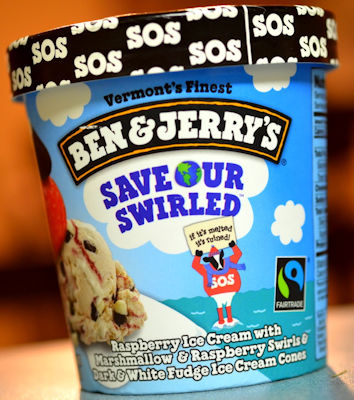Ben & Jerry’s, the makers of my all-time favorite ice cream, Phish Food, have a strong commitment to corporate social responsibility (CSR) that stems back to the 1980s, before CSR was cool. Co-founders Ben Cohen and Jerry Greenfield had a three-part mission statement: to make the world’s best ice cream, to run a financially successful company, and to “make the world a better place” (Gelles, 2015). In the late 80s and early 90s, the company was among the first to adopt progressive management tactics that we now take for granted, such as offering benefits to employees’ same-sex partners. Ben & Jerry’s also financed a campaign against bovine growth hormone that ultimately saved an untold number of family farms. When Unilever started negotiating with Cohen and Greenfield to buy the company, many feared that the concept of linked prosperity – the idea that businesses could pursue a double bottom line that balances profit and the people who make it possible – that the two believed in so strongly would be swallowed up whole in the takeover.
Right off the bat, those fears seemed to be proven true – a production plant and distribution center were closed with all workers laid off, sales representatives at the company’s headquarters were fired, and the company had to deal with protests against the company by current and former employees. It was a steep learning curve for both Unilever and Ben & Jerry’s, but now, nearly 20 years later, the company’s commitment to the original mission is stronger than ever. Revenue has nearly tripled since the takeover and the company has added hundreds of jobs. Part of that is because of the protections Cohen wrote into the takeover agreement with Unilever; an external board was created to oversee the company’s culture and social missions, and it does not report to any entity other than itself, in perpetuity (Edmondson, 2014). Some of the programs that the company has implemented include:
- More commitments to local farmers for fresh, local ingredients.
- A push for national labeling of genetically modified organisms (GMOs).
- Ambitious goals to reduce energy consumption and waste.
- Above-average compensation for employees – the company’s lowest-paid workers earn more than twice the national minimum wage.
- Using only cage-free eggs.
- B Corporation status, which is a voluntary certification by a nonprofit called B Lab. The nonprofit designates companies that uphold high social and environmental standards.

The company even incorporated its social and environmental stance in a relatively new flavor called Save Our Swirled, intended to raise awareness around climate change by depicting cows on top of melting icebergs on the label. The company encourages its customers to talk to their local governmental leaders about clean energy options. Ben & Jerry’s as a company also supports marriage equality and campaign finance reform (“Our Values,” 2017).

If there is a sour note for Ben & Jerry’s, it is on-going concerns over the treatment of migrant farm workers. The company has continued to deal with protests by Vermont dairy farm workers who are demanding that the company require the farms to observe a code of conduct that would guarantee the workers a weekly day off, seven vacation days a year, improved housing, and more. Arnulfo Ramirez, a dairy worker from Guatemala, said during one protest, “The majority of us farmworkers, we don’t even have a day off” (Greenhouse, 2015). Migrant Justice, the group behind the protests, is looking to Ben & Jerry’s to help other companies that use dairy farms to adopt its “Milk With Dignity” campaign. In 2015, the company signed an agreement with Migrant Justice, pledging to develop a detailed code of conduct. “Our whole mission and value system,” said Rob Michalak, Ben & Jerry’s global director of social mission, “it’s to ensure people in our supply chain have a dignified life.” Michalak continued to say that the company had already implemented some aspects of the Milk With Dignity program.
My feeling is that the company is “green” for its environment just as much as it is “green” for profit. It seems like Cohen and Greenfield’s CSR vision for Ben & Jerry’s, while changed and perhaps not exactly what they originally planned, is still very much alive. Ben & Jerry’s parent company, huge conglomerate Unilever, has even discussed trying to achieve B Corporation status through B Lab, though it admits it would not be feasible at this point in time. But at least they’re thinking about it.
What companies do you love for their commitment to social responsibility or activism? And more importantly, what’s your favorite Ben & Jerry’s Ice Cream flavor? Sound off in comments!
References
Edmondson, B. (2014, March 18). How Ben & Jerry’s brought maverick ideas to mainstream business. Retrieved April 22, 2017, from https://www.theguardian.com/sustainable-business/ben-jerrys-maverick-ideas-mainstream-business-values
Gelles, D. (2015, August 21). How the Social Mission of Ben & Jerry’s Survived Being Gobbled Up. Retrieved April 22, 2017, from https://www.nytimes.com/2015/08/23/business/how-ben-jerrys-social-mission-survived-being-gobbled-up.html?_r=0
Greenhouse, S. (2015, July 3). Farm Labor Groups Make Progress on Wages and Working Conditions. Retrieved April 22, 2017, from https://www.nytimes.com/2015/07/04/business/economy/farm-labor-groups-make-progress-on-wages-and-working-conditions.html
“Our Values.” (2017). Retrieved April 22, 2017, from http://www.benjerry.com/values

Leave a comment